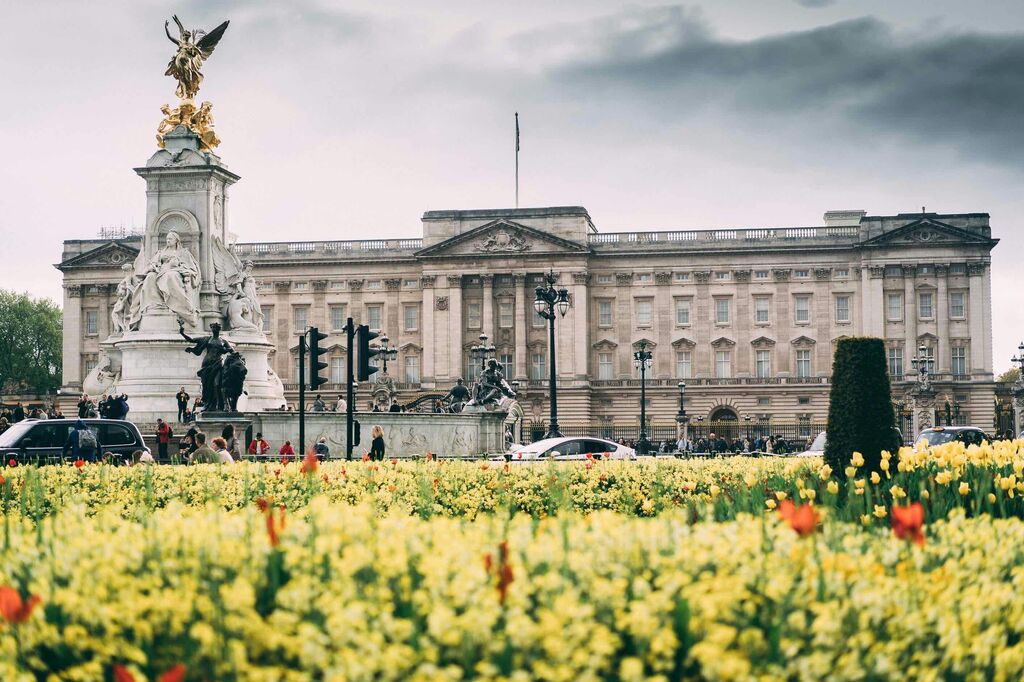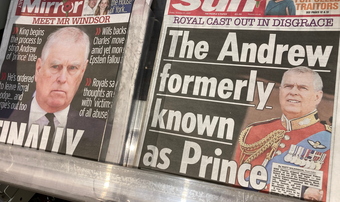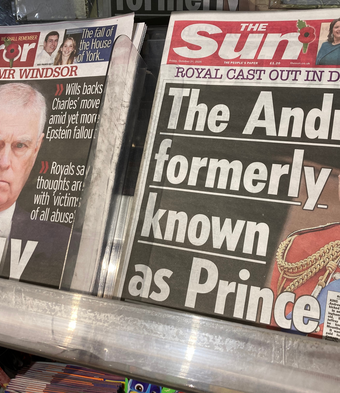What might it look like for Christians to be patriotic?

For as long as I can remember, I’ve always loved being British. Maybe it was our family holidays, which were normally composed of National Trust properties and cream teas (cream first, not jam!). I’ve always loved reading about our history (and can still recite the order of our Kings and Queens since 1066!). And don’t forget the sport: Jonny Wilkinson’s drop-kick; Ashes 2005; London 2012 and Andy Murray winning Wimbledon. Glorious days!
I’m the kind of person who, during the annual rewatching of Love Actually, is cheering along when Hugh Grant sticks it to the US President: “We may be a small country, but we're a great one, too. The country of Shakespeare, Churchill, the Beatles, Sean Connery, Harry Potter. David Beckham's right foot. David Beckham's left foot, come to that.”
But in recent years, the notion of patriotism has become increasingly contested. Yes, each time we had a Jubilee or a Royal Wedding (or whenever the Olympics swung around) we’d hear the traditional platitudes: ‘It makes you proud to be British’.
But it’s sometimes felt like the more common narrative we have been presented with is one centring around Britain’s problems, not its successes: isn’t Britain racist? Shouldn’t we be paying reparations for our role in the slave trade?
Rightly or wrongly, patriotism has become increasingly linked to the topics of immigration and integration. For years, the mainstream view had been that immigration was essentially a good thing, that it was vital for the health of our economy, and how diversity was our strength. But that liberal consensus on immigration has now collapsed: writing in The Telegraph last night, Keir Starmer conceded that the Left had got it wrong:
“There is no doubt that for years, Left-wing parties, including my own, did shy away from people’s concerns around illegal immigration. It has been too easy for people to enter the country, work in the shadow economy and remain illegally…
“Equally, the belief that uncontrolled legal migration was nothing but good news for an economy should never have been accepted on the Left. It is not compassionate Left-wing politics to rely on labour that exploits foreign workers and undercuts fair wages.”
In general, politicians have felt nervous around expressing a love of country, seemingly for fear of being called nationalistic or racist. ‘Patriotism’ felt like a dirty word, a space vacated for those on the far-right, with their Crusader costumes and St George’s flags. That has particularly been the case on the left, with questions over whether Jeremy Corbyn would sing the national anthem, or whether Keir Starmer wanted to abolish the monarchy.
No longer. Patriotism is back on the agenda. Because, it’s not just the far-right who care about their country: it turns out it’s really rather a lot of people!
Facing a collapse amid its traditional working-class support base, Labour is keen to reverse course while it still can. Polling from today shows that Reform is currently on track to comfortably be the largest party at the next election: a YouGov poll puts them on 311 seats, just 15 short of a majority. Labour, meanwhile, is forecast to have his worst result since 1931, falling from 399 seats to just 144. (The Conservatives fare even worse, and are currently due to shrink to just 45.)
This morning, as part of his speech about the introduction of digital ID for working people (which is being presented as an anti-immigration measure), the Prime Minister spoke at length about patriotism (and says it will be part of his keynote speech at Labour conference next week):
“The way I see it, this is the defining political choice of our times. A politics of predatory grievance, preying on the problems of working people and using that infrastructure of division, against the politics of patriotic renewal, rooted in communities, building a better country brick-by-brick from the bottom up, including everyone in the national story…
“In this era, we must be the nation-builders. We must be the patriots in our countries. We must show working people that we, and only we, can deliver the pride and belonging they seek, their communities strong, cohesive, change for the better, taking control of our future.”
There have been - rightly, in my view - many warnings in recent weeks about the influx of Christian nationalism here in the UK. But nationalism and patriotism are not the same thing. And in these next few years, when we will be presented with competing visions of what it will mean to be British, it is worth considering what wisdom the Bible has for us as we reflect on the relationship we have with our country.
Of course, the concept of a nation-state was far more fluid in the ancient world, where empires would rise and fall and borders would shift with the latest conquest; there is wisdom to be gleaned from ancient Israel, yes, but we cannot just map a theocracy (in which everyone worshipped the same God) onto our own democracy today.
But that also does not mean that the Bible has nothing to say: as the theologian Mike Bird likes to put it, ‘The Bible is written for us, but it is not written to us’.
We are to seek the good of the country…but of the whole country
As Christians, we want to seek the good of the country where we have been placed. This has always been a Biblical principle: even when the people of Israel were carried into exile, into a land of foreign gods and hostile powers, Jeremiah told them: “Seek the peace and prosperity of the city to which I have carried you into exile” (Jeremiah 29:7).
It is this which lies behind much of the New Testament teaching about government. We read in Romans 13: “The one in authority is God’s servant for your good. But if you do wrong, be afraid, for rulers do not bear the sword for no reason.”
We want the government to do a good job: we want it to promote good and to restrain evil, to bear the sword and enact justice, and to help everyone to prosper. That is why we pray for our political leaders too: “that we may live peaceful and quiet lives in all godliness and holiness” (1 Timothy 2:3).
Of course, as Christians, we also believe that, in God’s word, we can find the principles by which a nation will best be able to flourish. But we want to enact these not simply because they will make our own lives easier, but because we believe in the common good, and because God’s wisdom is good news for everyone, whether it be around the economy, the environment, or education.
Seeking the good of the city (or the country) cannot be abstracted from seeking the good of the people in it. A nation is more than just a plot of land (or a sceptred isle!). We are not just called to love some vague notion of national identity, but to “love our neighbour as ourselves” (and, as the parable of the Good Samaritan shows us, that neighbour can be anyone, regardless of their creed or colour).
It is here where I worry that some are conflating patriotism with nationalism: patriotism ought to include, to provide everyone with a sense of shared heritage, and to bring people together in love for their country.
The way in which nationalism is currently manifesting itself in parts of the UK is the opposite: the likes of Tommy Robinson sow division, flags are being paraded by some more like a war-banner than a sign of national pride, and people who are legally British citizens are saying that they feel like they don’t belong.
Loving our neighbour is not limited to the people who look like us. In the Old Testament, ‘resident aliens’ (that is, people who had permanently moved to Israel) had the same legal protections as regular Israelites; they were, to all intents and purposes, treated equally, unlike ‘sojourners’, who had not moved permanently and did not have the same rights.
Whatever concerns we have around immigration levels (and I too, feel that it needs to be drastically reduced), seeking the good of the country means seeking the good of all the people in it: it does not mean making British citizens feel alienated, or even afraid, as I have read from many friends on social media (even Christians, of different races) in recent weeks.
Indeed, rather than pursuing isolationism, surely we want to use the blessings we have been given to bless others. Even Israel itself - which had strict instructions around its interactions with the surrounding nations to safeguard its unique relationship with Yahweh - was designed to be a blessing to the nations (“all peoples on earth will be blessed by you” (Genesis 12:3)).
That will not simply look like immigration: it will encompass trade, treaties, international law, international development, and maybe even military intervention on behalf of the innocent.
But Jesus warns us: “From everyone who has been given much, much will be demanded; and from the one who has been entrusted with much, much more will be asked” (Luke 12:48).
We can celebrate our country…but we cannot feel a sense of superiority
Around 20 years ago, the historian Niall Ferguson wrote a book called “Empire: How Britain created the modern world”. There are few - if any - countries which have played quite such a major role in laying foundations for the world as we know it as the United Kingdom.
Mankind was tasked by God with “cultivating the world and subduing it” (Genesis 1:28): it’s sometimes known as the Creation (or Cultural) Mandate, and provides the basis for Christian engagement in everything from the arts to the sciences.
Britain’s contribution in this regard is something we can celebrate: James Watt and the steam engine; Michael Faraday and the electric generator; Tim Berners-Lee and the World Wide Web. In fact, a 2015 article estimated that an enormous 40% of inventions in the previous 50 years had come from the UK.
It’s not just the sciences; our authors range from JRR Tolkien to Jane Austen; we’ve exported the Beatles, Queen and the Spice Girls. James Bond and Harry Potter continue to rake in billions at the box office. We invented football, rugby and cricket. The list goes on…
And there have been moments in our national history when Britain has stood up in remarkable ways; from being the pioneer in the abolition of slavery (something we only finished paying for in 2015, almost 200 years on) to being the final European country fighting the Nazis (aside from Greece) in the early 1940s.
But a healthy Christian view of a nation cannot rest in smug superiority, or brush over its failures. No earthly nation lives up to the ideals of God’s Kingdom.
We believe that every nation is comprised of both good and evil: we are all made in the image of God and capable of good by his common grace. But we are also all sinners who have fallen short of His glory.
We cannot make an idol out of country, for in our island story there are things to deplore, just as there are things to celebrate. Concentration camps in the Boer War. The Amritsar Massacre. The treatment of the Mau Maus in Kenya. More recently, there is now widespread condemnation of our entry into an illegal invasion of Iraq in the early 2000s; or dismay at our sudden withdrawal from Afghanistan a few years ago.
Within our own borders, 4.5 million children are currently growing up in poverty, and inequality is so pronounced that 17% of UK adults skip meals at least once per month because of the cost-of-living crisis. The House of Commons has passed legislation to introduce Assisted Suicide, and there are more than 200,000 abortions every year.
Nationalism can lead to a sense of looking down upon others: we might think of the Parable of the Pharisee and the Tax Collector, in which the Pharisee says "‘God, I thank you that I am not like other people—robbers, evildoers, adulterers—or even like this tax collector" (Luke 18:11).
Patriotism must not mean sweeping a nation's failures under the carpet. Countries can never be split into all good, or all bad: the truth will always be far more complex.
We can say that being British is part of our identity…but it cannot be our primary identity
There are many things which form part of our identity: our age, our sex, our family relationships. Our nationality is also a part of who we are. I am British: I don’t mind queuing, I’m used to it raining, and I enjoy 'Yes, Minister', watching cricket and having afternoon tea.
These things don’t stop being a part of who we are when we become a Christian. Paul may have said that there “in Christ there is neither Jew nor Greek, neither slave nor free, neither male or female”, but he did not mean that these things stop existing full-stop: indeed, he addresses men and women individually, and gives slaves advice on how to relate to their masters.
Being male or female, or being from a particular nation, does have an impact on who we are and how we live in the world around us.
But Paul did mean that these things were not the primary part of our identity any longer. He writes in Philippians 3:
“If someone else thinks they have reasons to put confidence in the flesh, I have more: circumcised on the eighth day, of the people of Israel, of the tribe of Benjamin, a Hebrew of Hebrews; in regard to the law, a Pharisee; as for zeal, persecuting the church; as for righteousness based on the law, faultless.
But whatever were gains to me I now consider loss for the sake of Christ. What is more, I consider everything a loss because of the surpassing worth of knowing Christ Jesus my Lord, for whose sake I have lost all things.”
Paul’s Israelite credentials had been impeccable: ‘a Hebrew of Hebrews’. But everything is a loss compared to knowing Jesus as Lord.
Every earthly community we are part of is nothing compared to our primary identity: being in Christ. In him we are “ransomed, healed, restored, forgiven”.
John writes in the Prologue to his gospel, “To all who did receive him, to those who believed in his name, he gave the right to become children of God— children born not of natural descent, nor of human decision or a husband’s will, but born of God.” (John 1:12-13).
At times, this will mean that we do not feel at home in the world around us: Peter describes us as “foreigners and exiles” (1 Peter 2:11). And that is to be expected, because, as resurrection-people, we are ourselves already a glimpse of God’s new creation, stuck between this fallen world and the world which is to come.
We may indeed be citizens of the United Kingdom, but really, our deeper, truer citizenship is of the heavenly Kingdom, as Paul writes (Philippians 3:20). That does not mean that we turn our back on this world: Philippi was a Roman colony, in which the Roman citizens were supposed to bring a little piece of Rome with them (similarly, as heavenly citizens, we are supposed to bring a little piece of heaven to earth).
As Christians, we can be patriotic: we can love our country, seek its best, and be proud of its achievements (and conscious of its faults). But let us not confuse it with our true home.
Every year, on Remembrance Sunday, the hymn ‘I vow to thee my country’ is sung across the country; it’s a hymn about love and duty to one’s nation. I remember speaking once to a clergyman who said that the only reason he felt he could ever select it was its second verse:
“And there's another country, I've heard of long ago, Most dear to them that love her, most great to them that know; We may not count her armies, we may not see her King; Her fortress is a faithful heart, her pride is suffering; And soul by soul and silently her shining bounds increase, And her ways are ways of gentleness, and all her paths are peace.”
It is to that other country - the heavenly city that is to come - that we owe our true allegiance; and to the King who we do not see now, but who, one day, we will see face to face.






